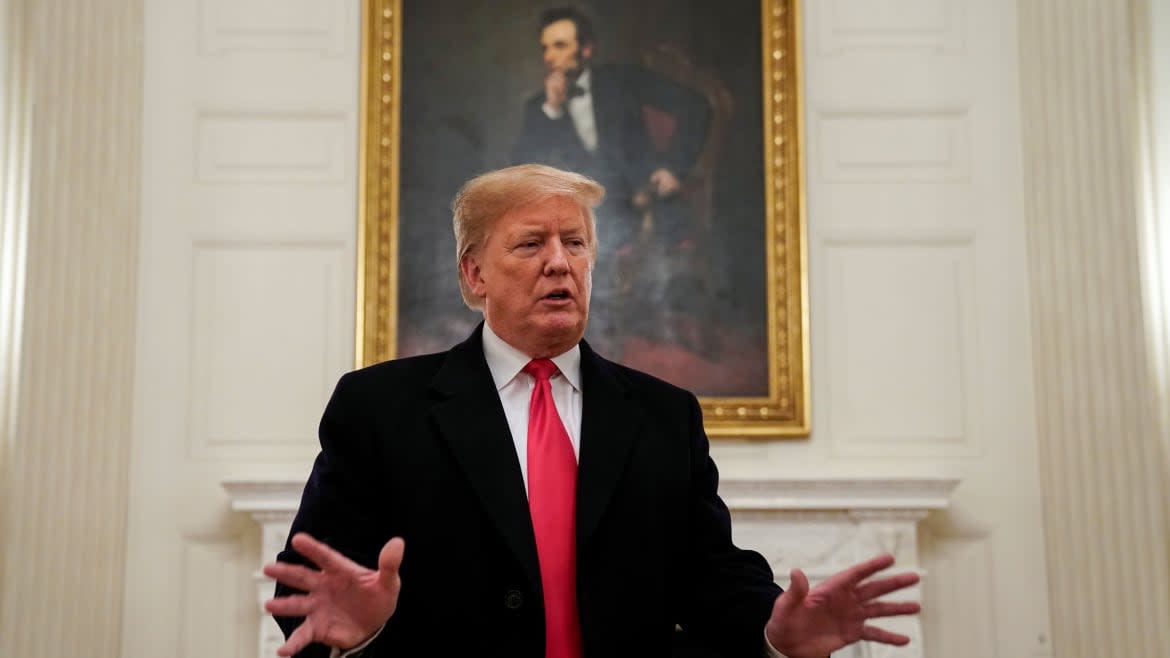One More Reason Why Lincoln Is Better Than Trump: His Spies

The resignation of national intelligence director Dan Coats, who publicly contradicted Donald Trump’s rosy view of Russian and North Korean threats, opens old wounds. Trump has long publicly denigrated the spy community, which has infuriated seasoned espionage hands. But he isn’t the only chief executive who’s had run-ins with this nation’s intelligence apparatus. Go back to the Civil War and you find that spycraft posed a headache for another Republican president.
Although both Abraham Lincoln and Trump struggled to navigate the intelligence landscape during their presidencies, Lincoln ultimately succeeded in piecing together a makeshift information network, while Trump so far has failed, still relying too often on his gut instinct rather than empirical evidence from his spy agencies.
Granted it may be a stretch, but there are parallels between these two men. Trump assumed the presidency with no government experience. Lincoln had not much more seasoning—one term in the U.S. House of Representatives and four terms in the Illinois state legislature.
Both men inherited a nation deeply divided politically. With members of Congress assaulting one another on the House and Senate floors before the war and 750,000 square miles of the United States cleaved off to form a rebel nation after the fighting started, Lincoln, of course, faced a far worse situation and tried his mightiest to hold the country together at the outset. Trump has been content to further exploit the divisions that existed before he took office.
How Lincoln’s Compassion for a Gold Star Mom Shames Trump
Trump entered office contemptuous of the CIA, FBI, and the military’s intelligence agencies, claiming at campaign rallies that he understood world threats better than the generals or spymasters, and later accusing government agencies of snooping on him when he was a candidate.
There was no spy organization for Lincoln to disdain when he became president. At the war’s outset, General Winfield Scott, the Union Army’s commander, had no intelligence staff and hired off the street a former San Francisco vigilante named Lafayette Baker to spy on the Confederate force gathering at Manassas Junction.
In the first year of the war, Lincoln had good reason to be contemptuous of the military intelligence capability that evolved. Neither the White House nor the Union army ever had a centralized spy service. Local commanders, none of whom had any training in the dark arts during their cadet days at West Point, were expected to organize their own spy services for their divisions and corps.
The closest to a spymaster the Union force had was Allan Pinkerton, a nationally known Chicago detective who became the secret service chief for the Union’s all-important Army of the Potomac commanded by General George B. McClellan. But Pinkerton, who operated under the pseudonym E. J. Allen, ended up being a failure as a military intelligence officer, feeding McClellan wildly inaccurate reports that inflated the number of Rebel troops the Union general faced. Pinkerton also spied on Lincoln for political intelligence he thought might be useful for McClellan.
By the winter of 1861, the president suspected McClellan, with Pinkerton’s help, was dialing up the Confederate numbers to justify his not moving against the enemy until he had more soldiers. Lincoln reportedly once deadpanned to a visiting New England delegation that he knew the Confederates had a one-million-man army. Why? Because whenever his generals fought the Rebels they always told him they faced two-to-one odds. “Now I know we have a half million soldiers in the field,” he said, “so I am bound to believe the rebels have twice that number.”
Intelligence collection in the Army of the Potomac improved dramatically when it was taken over in February 1863 by Colonel George Sharpe, an erudite New York lawyer who pioneered what spy agencies today call “all source intelligence.” Sharpe raked in information not only from his spies but also from prisoner interrogations, aeronauts flying balloons over the battlefield, signal officers intercepting Rebel telegraph messages, and cavalry scouts on reconnaissance patrols—all to produce intelligence reports that outpaced anything the enemy could muster.
But even Sharpe had his intelligence failures. In the summer of 1864, he lost track of an entire Confederate corps, whose 12,000 men turned up at the gates of Washington, D.C., embarrassing a president already under fire for lack of progress in the Union war effort.
Lincoln and Trump could not be more different in their response to a president’s intelligence conundrum. Lincoln checked out books on military strategy from the Library of Congress and paced back and forth in his bedroom at night digesting them for a crash course on how to wage war. Trump doesn’t read books.
Early in his presidency, Lincoln had the Army begin sending him daily intelligence reports on what it learned about Confederate military movements and throughout his tenure he carved out time in his busy schedule to interview news correspondents on what they learned during visits to the South and to grill Army officers for information they picked up from the front. Trump does not regularly read intelligence summaries that have been prepared for him and sits for relatively few briefings by his spy agencies. He does stay glued to Fox News each morning.
When Pinkerton met with Lincoln to milk him for political information McClellan would find useful, the president, realizing what the Chicago detective was up to, turned the tables and pumped the unwitting Pinkerton for intelligence on his general. Such nuance and mental dexterity as president are not Trump’s strong suit.
Douglas Waller’s next book, Lincoln’s Spies, will be published by Simon & Schuster on August 6.
Get our top stories in your inbox every day. Sign up now!
Daily Beast Membership: Beast Inside goes deeper on the stories that matter to you. Learn more.

